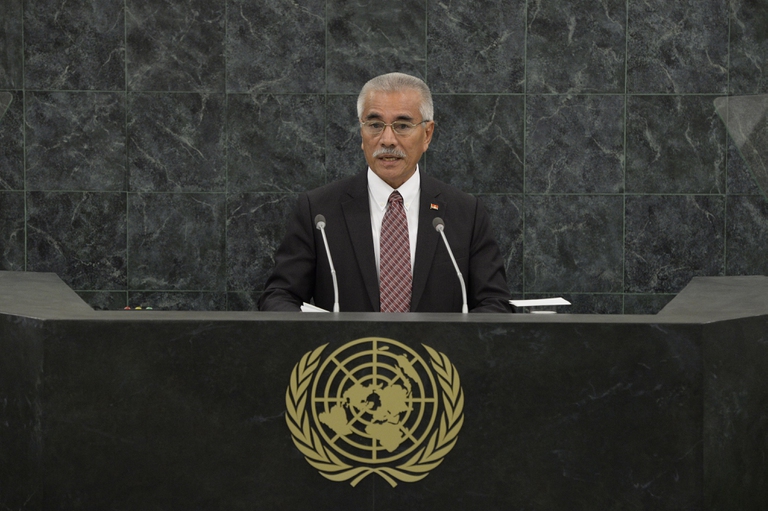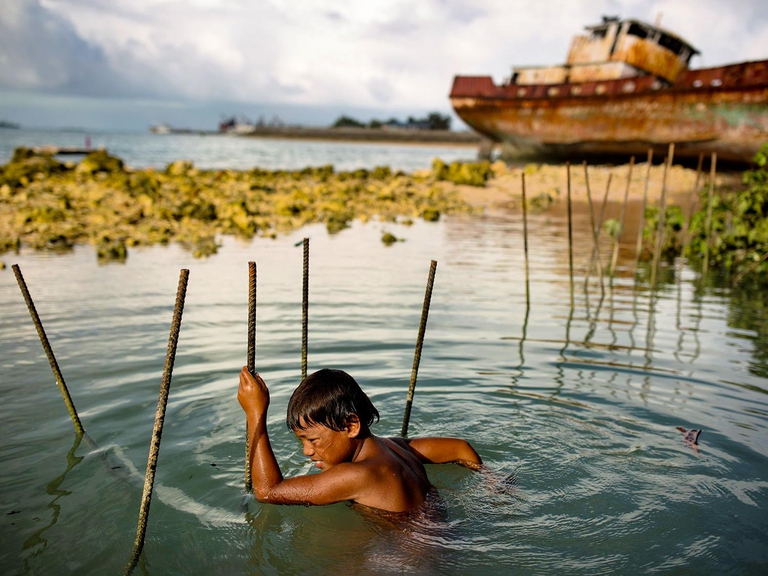
A group of experts in Tokyo suggested pouring radioactive water from Fukushima into the open sea. A marine biochemist explains the consequences of this absurd decision.
Saving the future of humanity is a feasible challenge according to Anote Tong, former president of Kiribati and now climate activist. Because not only is the future of the Earth’s climate at stake, but so is an entire generation of young people that have done nothing wrong. Take a grandfather’s word.
Undisputed leader in the fight against climate change, for over ten years – from 2003 to 2016 – Anote Tong was President of Kiribati, one of the island states most threatened by rising sea levels. Kiribati is an archipelago in the Pacific Ocean made up of 33 coral atolls and other small islets. To try and protect this natural paradise of biodiversity and save its inhabitants, Tong has put himself on the frontline, as president first then as activist, in the international fight against global warming.
Today, in fact, Tong is ambassador for Conservation International, the NGO that recently announced a record plan to reforest the Amazon by planting 73 million trees. One of his great legacies as president was pioneering the concept of “migration with dignity”, even though this expression has been misunderstood or exploited more than once. Over the course of the climate change conference in Bonn, the COP23, we asked him to tell us more about this as well as other challenges for safeguarding of the climate.
In 2011 you said many of the inhabitants of Kiribati’s 33 islands go to bed every night afraid that something may happen to their homes, especially in periods of high tide, due to rising sea levels. Six years have passed since then, what is the situation now?
Discussion of climate change has been stimulated by the sides coming forward from the United Nations Intergovernmental Panel on Climate Change (IPCC). They’ve been very clear with the 4th and now the 5th assessment report which projects that within this century countries like Kiribati, Tuvalu, the Marshall Islands and the Maldives in the Indian Ocean will be under water. Unless we conduct radical adaptation initiatives we’ll be underwater well within the century. This is a future that is very difficult for anyone to think about. For me, I was a leader when I was advocating and dealing with this. Since I retired from politics, I’m still a grandfather with a lot of grandchildren, so the issue remains extremely relevant for me. I watch my grandchildren play and I ask myself: “What will happen to these young people?” Because climate change, while it’s already happening and having an impact, won’t threaten my life. But it’s certainly going to threaten the future of my grandchildren. This is the way we should look at it. People say it’s not a problem because they think about themselves. But it’s not about our generation, it’s about the next generation and the one after. We’re talking about people, about the future of people, the future of nations of peoples. This is what’s at stake.
Under your presidency, in 2012, Kiribati acquired lands abroad – in part also in Fiji, which presided over the COP23. What is the current situation in terms of moving the people of Kiribati?
I never said we would move our people to Fiji. The act of finding the land was trying to send a message to the international community because there was no response. Nobody was coming forward to say “you have a problem, we will help you”. So buying land was a very strong statement to the international community. It is also an investment in fact, because that piece of land will be worth a lot more in the future. People and journalists have asked me “are you moving your people?” My answer is “no!” Why do I say this? Because I won’t be doing it while I’m in office, whoever follows me may choose to do that because it might become necessary. Let me make a statement which I think has been a very interesting development: the Fiji government has come forward to say that if Tuvalu and Kiribati need somewhere to go due to climate change and have nowhere else, then Fiji will welcome them. If that is the case then Kiribati has the piece of land to settle some of them.
As president you pioneered the notion of “migration with dignity”. What was said on the theme of migration in the negotiation process?
There has been a lot of discussion about this topic. The reality that we have to face is that whatever we do in terms of building resilience on our islands, it’s most unlikely that we’ll be able to build up the land mass that would be able to accommodate the entire population – let alone any subsequent increase in population. We have to understand that we’re talking in 20-30 years’ time. We have to face the brutal reality that some of our people may have to migrate because it won’t be possible to accommodate all of them on whatever island we raise or however we respond to the challenge of climate change. What I’ve heard is: “So your people will become climate refugees”. I’ve always rejected the notion that our people should become refugees. I reject the terminology, the classification of our people as climate refugees. Because the last thing we wish to lose, after our land, is our dignity. We would like our people to make the choice, if they decide to move voluntarily. But they would move with dignity. How would we achieve that? We must be proactive rather than victims. We would actively provide education and training for our people so that they have the qualifications to move into other societies as skilled people. They would be able to integrate into the communities they go into as worthwhile citizens, community leaders. And they would be able to do it with dignity.
In 2015 you called for a global moratorium on coal. During our time at the COP23, we visited the Garzweiler coal mine, 60 kilometres from Bonn: an open wound that humans have created in the Earth’s surface and that we keep open to feed our hunger for cheap energy. How is it possible that still today, in Germany, European leader in the fight against global warming, there is an active mine that is so large and has such a devastating impact on people and the environment?
Well, this is my very question. How can this be possible? That an enlightened and forward-thinking country like Germany continues to do this. I think the answer must remain within the conscience of the German people and government. What I can share is, when I called for a moratorium on the opening of new coal mines it was putting into reality the commitments that people made in Paris in 2015. If countries made that commitment, how can we continue opening new coal mines when we’ve decided to cut emissions? I see these as contradictions. So that is the challenge.
Having left politics, you’re now especially active with the NGO Conservation International. We recently gave the news of the largest reforestation programme in the Amazon ever undertaken. How important are such projects?
This is something that has been defying the Marrakesh Partnership because governments aren’t always the best agents to undertake change. There’s a great deal more conservatism in governments because they’re led by politicians. And politicians are sensitive to what they perceive as political issues. Most are quite unlikely to make rapid change. This is why it’s important for civil society and NGOs to be active, especially ones with the competencies. When I retired from politics in 2016 I was able to continue the work with Conservation International. This is an area where the objectives and purposes of Conservation International are well in alignment with my own.
This is a partnership and this is why it’s important we do this, but what’s more important is that we should support and partner with governments and other members of society. So that what is happening with the forests can also be transferred into the ocean space to deal with the challenges the ocean is now facing: acidification, pollution, plastics. This is important, it is effective to work with organisations specialising in things like these.
Today Fiji holds the presidency of the COP, do you think Kiribati may ever preside a global summit such as this one?
I’m one who doesn’t believe anything is impossible. I think it’s very possible. I think Fiji wasn’t able to host it physically but that partnership, the North-South partnership, is important and we need more of this. Fiji understands the challenges of climate change much more than Germany does. Poland is the next host. It would’ve been wonderful if Poland had done it in partnership with another small island developing state. So there is this balance of understanding what is at stake.
Siamo anche su WhatsApp. Segui il canale ufficiale LifeGate per restare aggiornata, aggiornato sulle ultime notizie e sulle nostre attività.
![]()
Quest'opera è distribuita con Licenza Creative Commons Attribuzione - Non commerciale - Non opere derivate 4.0 Internazionale.
A group of experts in Tokyo suggested pouring radioactive water from Fukushima into the open sea. A marine biochemist explains the consequences of this absurd decision.
The decline in grey and humpback whales in the Pacific and Atlantic Oceans has been traced to food shortages caused by rising ocean temperatures.
The United Nations has launched a major international alliance for ocean science, undertaking a mission close to all our hearts.
The cargo ship that ran aground off the coast of Mauritius on 25 July, causing incalculable damage, has split in two and its captain has been arrested.
The largest coral reef in the world is severely threatened by climate change, but researchers are developing strategies that could contribute to saving the Great Barrier Reef.
Seychelles have extended its marine protected area, which now covers over 400,000 square kilometres, an area larger than Germany.
Norwegian oil giant Equinor had pulled out of drilling for oil in the Great Australian Bight, one of the country’s most uncontaminated areas. A victory for activists and surfers who are now campaigning for the area to be protected forever.
30 per cent of the planet needs to be protected to stop precipitous species decline. The UN has set out its aims for the the COP15 on biodiversity scheduled for Kunming, China in October.
Ocean warming has risen to record highs over the last five years: just in 2019 the heat released into the world’s oceans was equivalent to that of 5-6 atomic bombs per second. The culprit, no doubt, is climate change.









